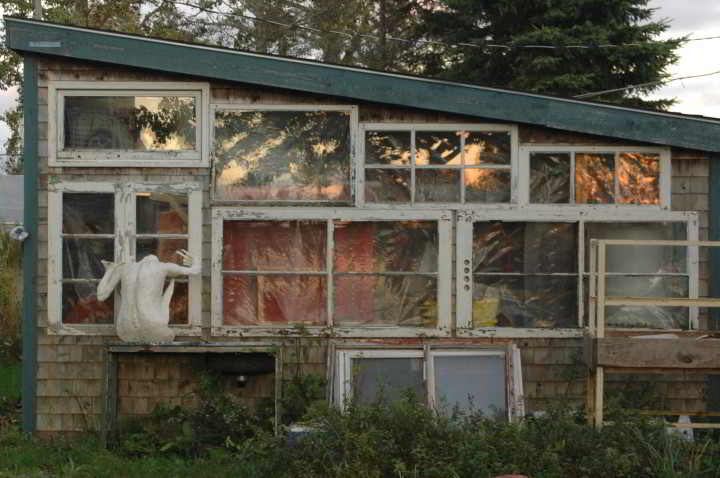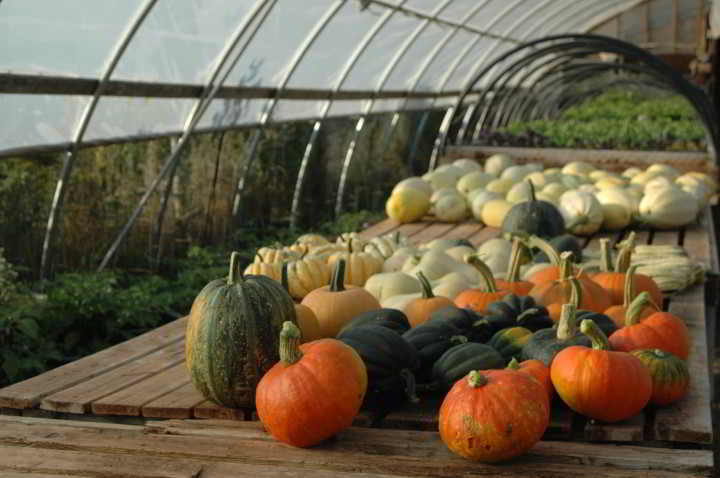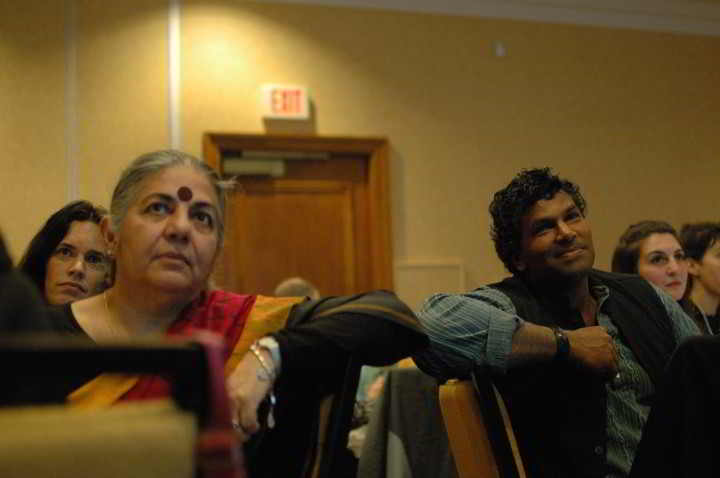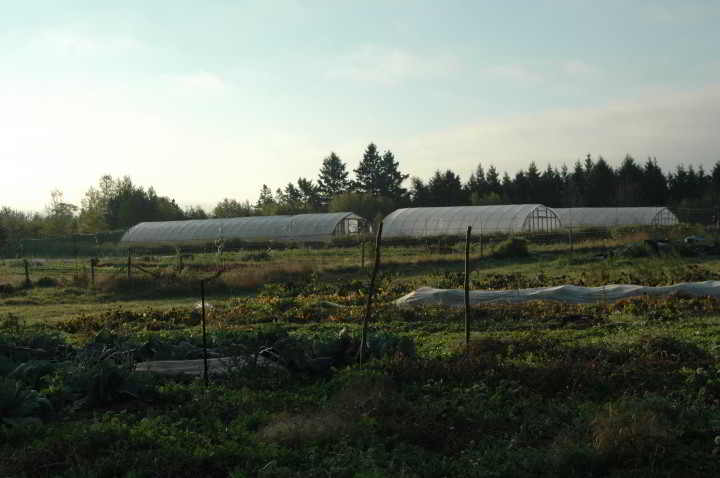Reflections on the seasonal and transient life of farm apprentices and interns by Bernard Soubry.
We had snow the other day in Maitland. I spent a few frantic hours hauling celeriac out of the cold mud and praying that the clouds would break–long enough for us to plant the rest of the garlic in the back field, at least. But after that storm, everything had changed. The farm I’d come to earlier in the season is totally covered now; you can’t work outside without four layers on; the chickens chirp at us angrily in the morning when their water freezes.
Winter’s here, and we’ve lost the luxury of denying it. My farmers and I are all making our own preparations. Owen is greasing and oiling every tool or machine he can get his hands on; Sina is warily prodding the seed catalogues that have just arrived. Me, I’m looking for a place to live for the winter, because I’m leaving.
It happens to me ever time I work a season on a farm: the first big frost descends, and I’m reminded that, for all the energy I’ve put into a place, and no matter how happy life has been there, the season is over—and I have to move on.
I’m not being forced to go; it’s just a part of the agreement I have as an apprentice. I would come to work until December, and then I would go. Such is the nature of the farming apprentice’s life: find a farm that will have you, stay as long as everyone is happy and that there’s work, but leave when one of the two conditions is no longer fulfilled. I understand that. I go into it willingly, if not altogether calmly.
Why go through this moving stress? Part of it is self-imposed. As an apprentice to the craft of farming, I know that part of my education is to find as many ways of doing the same thing, on as many scales as possible. I don’t know how I want to farm yet, and each farmer for whom I work can only conceivably show me their way. You learn through diversification. So you work as many farms as you can, under as many conditions as you can. I need to move because it’s essential to my growth as a farmer.
Part of it, though, is the nature of the farming season: I was hired for a certain period of time. Now that it’s over, my farmers need space and time to do their planning for the next year without having to be hosts or pedagogues. For the past nine months, Four Seasons Farm has been a host to dozens of WWOOFers, short-term workers, long-term interns, apprentices, visitors, and general waifs and strays. Now, at November’s end, it’s not surprising to me that Owen and Sina want their space. I can’t overwinter here without being a stressor to two people who desperately need to be alone with their business plan and some mulled wine. (Perhaps not simultaneously.) I need to move because my contract was temporary, and now it’s done.
But even though I sympathize—and I must insist here that I do—you can already see that the situation poses several fundamental problems.
One: I miss out on one of the most important parts of my farming education. Winter is, or should be, a part of an apprentice’s training: so much of what happens in the art of farming—crop rotations, seed orders, shifts in strategy–is plotted and planned out under cover of winter darkness. As an apprentice, I want to be witness to those decisions and understand the thought process behind them. I can’t do that if I’m bussing tables in the city. If we want apprentices who can become full farmers, we need apprenticeships that go through a full year, and many farms don’t—can’t—offer that.
Two: I have to keep working to survive financially, which means not farming. Farm apprenticeships, despite often coming with room, board, and ridiculously good food, are rarely lucrative. I have the money to survive a few months, but not in a city, and not without supplementing my income. A typical full-season apprentice in Nova Scotia works from March to November, ten hours a day. As an apprentice, I can’t afford to live off the savings I’ve made here for the winter—let alone try to acquire any kind of capital for, say, thinking about land purchase. It’s not exactly conducive, either, to getting a healthy credit history, or acquiring assets for a possible future loan. Farming is a tradition that has often embraced subsistence rather than (financial) wealth, and I accept my lot; but in the falling shadow of the day, even the former seems a long way to go.
Three: For all intents and purposes, the farm I’m working on is my home. This isn’t the case for every apprentice, but it is for many. What it means for me is that, come December, I can either try to find an apartment in Halifax; move all my stuff back to my parents’ house in Quebec; or spend every last penny on a camper van and a shaggy, affable dog and finally be free of domestic troubles. None of these are particularly appealing options. All of them mean leaving what I think of now as home. I’m embarking on an educational journey that attempts to bring strength and knowledge to food systems in the provinces I’ve decided to call my own—does that mean I have to do it in a state of geographical and emotional instability?
Please don’t think I regret my decision, though. At the conference for the Atlantic Canada Organic Regional Network (ACORN) conference last week in Halifax, I actually felt good about my choices. I was in a room where being a farmer was a point of pride, and where my status as an apprentice was celebrated. The Minister of Agriculture for Nova Scotia was there, and he praised us (!) for heralding the future of sustainable agriculture, and promised that his government would support the development of healthy, sustainable food systems and those who worked to create them. Vandana Shiva herself (!!) was there, spurring us on to sow more love, and to support those who wanted to keep food and seed in the hands of the people. All the farmers and community organizers were smart and charming and helpful, and the workshops taught me everything from low-till techniques to marketing strategy. Doing this, devoting my time to apprenticeship, felt not only right, it felt possible.
But sitting in a resource exchange workshop, like Holden Caulfield in front of the Central Park ducks, I asked the eternal question that had arisen in my mind with he first hard frost: “Where do apprentices go in the winter?” And most people laughed. They laughed because, yes, I am a funny and charming person, but mostly because the real, sustainable answer still doesn’t really exist. We had been praised and encouraged, yes, but not supported, I realized. Not in any way that would make me feel safer—financially, geographically, emotionally.
I find myself in a situation where I am devoted to helping develop the province’s most rapidly growing economic output; to constructing stable and sustainable communities, economies, and systems of food sovereignty; and to working as hard as possible as possible to accomplish those goals. I’m part of a group heralded by international leaders as becoming one of the best scientists of today. I am promised support by my provincial government. And yet I’m now faced with learning my trade while being cyclically homeless and financially unstable. Does that sound at all ridiculous to anyone else?
I’m learning to become a farmer; someone who, by nature, fixes problems and overcomes challenges systemically, with elegance and grace and sweat. I know the road isn’t supposed to be easy. It’s part of the job I want to have. And I understand that, as a group, we’re responsible for coming up with the solutions with this. But I don’t think it would be unreasonable to try to make some of those solutions systemic, or accessible to those who want to find them.
Apprentice friends: what are your overwintering strategies? I’m coming up empty here. How do we help ourselves make farming apprenticeship a yearlong, cyclical process? And how do we do it without being left out in the cold?
 Bernard Soubry farms and plots his next move at Four Seasons Farm in Maitland, NS. Want to help him find his next learning and living space? Give him a shout.
Bernard Soubry farms and plots his next move at Four Seasons Farm in Maitland, NS. Want to help him find his next learning and living space? Give him a shout.


 Filter by Popular Categories
Filter by Popular Categories



